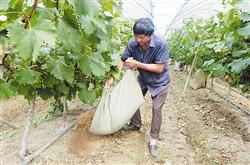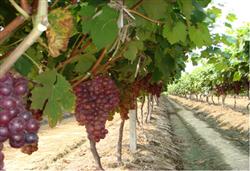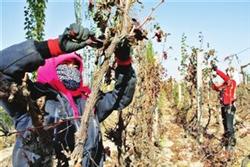Key points of summer fruit management of grape

Fruit management is the core of summer management. First, calcium and boron nutrients were sprayed on the foliar flower ear at flowering stage to increase the fruit setting rate and fruit firmness. Second, remove the sub-tip when the bud before flowering, so that the shape and size of the ear are consistent. Third, when the fruit reaches the size of pea, remove too small fruit, poor miscellaneous fruit, deformed fruit, disease and insect fruit, dense fruit and injured fruit and so on. After thinning, the fruit grains were uniform, and 60 murine 80 grains per panicle were retained. After setting the fruit and panicle, the insecticidal fungicide should be sprayed strictly and carefully, and the liquid should be bagged in time after drying. Select high-quality double-layer paper bags to remove the bags in time before harvest to promote coloring. Pest control directly affects the normal growth and development of fruit trees. Grape pest control should be done according to climatic conditions in summer. The rainy season will enter from June to July, which is conducive to the occurrence and spread of many diseases such as downy mildew, white rot, black pox and anthrax. Seizing this critical period, rational drug selection and drug control are the prerequisites for controlling the harm of multiple diseases and protecting young ears, young fruits and leaves. First, the key control objects after anthesis (mid-June) are downy mildew, black pox and white rot. It can be sprayed with a single spray of 25% Amisi and 2000 times the liquid. If there is more rainfall, high humidity, downy mildew, black pox and white rot, 68% Jinlei or mildew 600 mol 700 times + Shigao 2000 times or 50% carbendazim 600 ml 800 times can be sprayed. Second, the key points of prevention and control during ear formation period (late June) are downy mildew, white rot and anthracnose. On the basis of the above spray, it can be prevented with protective fungicides, which can be sprayed with 1 ∶ 0.7 ∶ 200 times Bordeaux solution, or 75% dichlorothalonine (chlorothalonil), 78% Cobo and so on. Third, the fruit expansion period (first and middle July) has entered the flood season, which is the key period for the occurrence of many diseases such as downy mildew, white rot and anthracnose. We should pay close attention to the occurrence of the disease and weather changes, and take corresponding measures. If downy mildew occurs, 68% Jinlei or mildew 600 Mel 700 times spray can be used. The occurrence of white rot and anthrax can be sprayed with 2000 times as high as 10% of the world or 800 times of carbendazim. If the above diseases are complicated, a mixed spray of 2500 times of 10% of the world's height and 68% of Jinlei or 600 times of mildew can be used.
- Prev

High-yielding cultivation techniques of New Grape varieties
1. One of the main characteristics is the large grain size of the ear. The high wife grape belongs to the large panicle and large grain type, the ear is large and compact, the average ear weight is 600 grams, and the average grain weight is 17 grams, which can reach more than 20 grams after thinning flowers and fruits, which is much larger than that of red and black grapes, which is comparable to ping-pong grape. Second, the quality is good.
- Next

Grape varieties and pollution-free cultivation techniques
The period of winter pruning of grapes is generally from the first ten days of November to the middle of February of the following year, that is, from 2-3 weeks after defoliation to 3-4 weeks before the occurrence of spring injury. Pruning too early will affect the return of nutrients, too late will easily lead to bleeding phenomenon. Bleeding often affects the germination of bud eyes, growth and fruit. Now it is mainly.
Related
- Moge, come on! The staff of the peasant association in the producing area of cantaloupe were frightened when the crowd gathered.
- Causes and Solutions of low Fruit setting rate of Apple
- Symptoms and control measures of passion fruit virus disease
- Fruit growing lesson: how do apple orchards keep high yields?
- Can you build orchards in the mountains? What are the pros and cons?
- How to manage the coloring period of Crisson grape?
- This paper introduces the processing technology of two kinds of fig products.
- How much is a month for retired teachers in rural areas by 2020?
- How can strawberry planting increase sugar content? We should pay attention to management in many aspects.
- What are the cultivation techniques on how to improve the yield of golden fruit?

